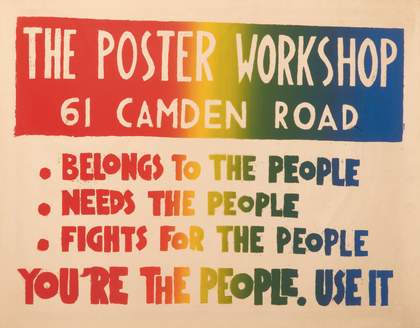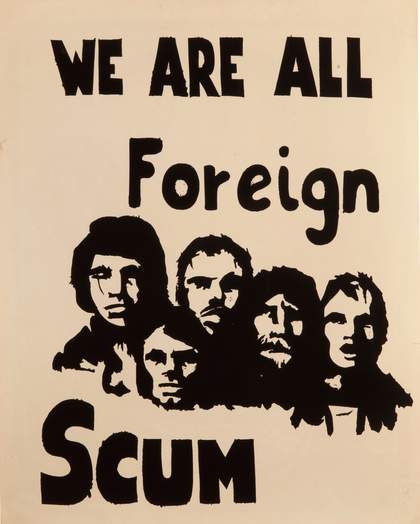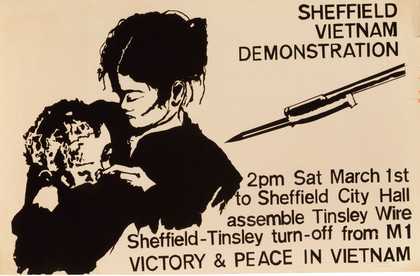
Poster promoting the use of the Poster Workshop in Camden, 1968
Courtesy Alexander Peter Dukes and Poster Workshop, Camden
The Poster Workshop was created in a basement in London’s Camden Town by Sam Lord and me – an artist and a lawyer respectively. In particular, we were inspired by student sit-ins and occupations that had begun at the Sorbonne in Paris in May of that year, and that were being given vivid silkscreen poster expression by L’Atelier Populaire set up by a group at L’École des Beaux-Arts. However, we were also driven on by several serious political issues – for example, the Vietnam War; the fear and threat of nuclear weapons; rent and industrial strikes; racism and the civil rights movements in Ireland, America and South Africa; and the iniquities of imperialism and capitalism.
There was a vibrant atmosphere in the workshop – a feeling of being relevant, useful and part of the action. We could express our left-wing ideas by means of the cheap and simple process of silkscreen poster production. It was run by a core of a few dedicated members, who included – as well as Sam and me – Sarah Wilson and Jo Robinson (both artists), Harry Beck (ex-navy) and Frederick Egbert Scrivener (retired print worker), although others also joined in, usually for specific projects. Everyone was encouraged to learn how to make posters, particularly those who needed them. No one was paid for participating, nor was there any obligatory charge for posters since everything was financed by voluntary contributions and fund raising.

Poster designed by Peter Binns during the LSE student occupation in October 1968, where the Poster Workshop had set up a temporary silkscreen printing press in the refectory; printed as a riposte to Tory MP Tom Ironmonger's claim in the House of Commons that: ‘The British people are fed up with being trampled underfoot by foreign scum.’
Courtesy Alexander Peter Dukes and Poster Workshop, Camden
About 220 different posters were created in the workshop, each with an average run of well over 200, amounting to a total of approximately 50,000. In addition, several travelling workshops were also set up, most notably at an occupied London School of Economics, at Essex University, and in Derry and Belfast in the north of Ireland.
After closing in 1971, the Poster Workshop left behind a permanent visual record of many of the issues of the day, having made what was arguably the most prolific contribution to the history of radical silkscreen poster creation, certainly in the UK.

Poster thought to have been ordered by students at Sheffield University, designed by Detta Kelly and Sam Lord, 1968
Courtesy Alexander Peter Dukes and Poster Workshop, Camden
London: 1968, curated by Andrew Wilson, Curator Modern and Contemporary Art and Archives, Tate Britain, until 4 November. 1968: Protest and the Photobook, curated by Sarah Allen, Assistant Curator, International Art, Tate Modern, until 3 December. The Poster Workshop 1968–71 is published by Four Corners Books.
Alexander Peter Dukes is a former constitutional lawyer and is now a writer of themed aphoristic poetry. He has recently published a book titled The Fallacy of the Excluded Alternative.
